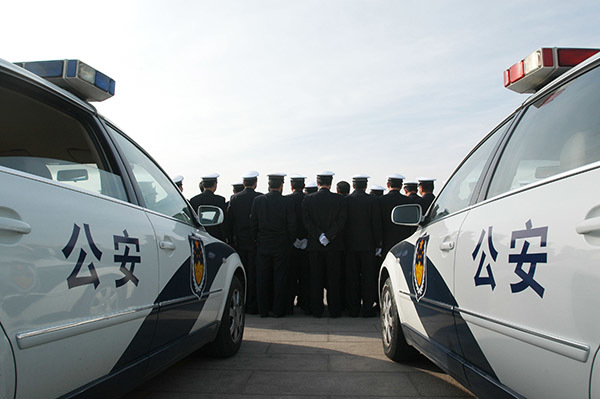Dark clouds hang over Tiananmen Square in Beijing. (Lintao Zhang/Getty Images)
[People News] The power struggle in Beidaihe ahead of the Fourth Plenary Session is set to become increasingly intense. Recently, reports have circulated in Chinese circles that Liu Jianchao, the Minister of the International Liaison Department, has been taken away for investigation, a claim later confirmed by the Wall Street Journal. On August 11, Hong Kong's Sing Tao Daily reported that Liu Jianchao was under investigation after returning to Beijing from an overseas trip at the end of last month.
Additionally, there are rumours of another prominent figure under investigation: Guo Shuqing, the former Party Secretary of the Central Bank and Chairman of the China Insurance Regulatory Commission, who is a major player in the Chinese Communist Party's financial sector.
On August 11, the X platform user 'Wanjun Xie' posted: 'It is rumoured that Guo Shuqing, Chairman of the China Banking and Insurance Regulatory Commission, has been taken away for investigation by the Central Commission for Discipline Inspection and the National Supervisory Commission. Guo Shuqing is affiliated with Xi Jinping's faction.'
Wu Guoguang, a key member of the think tank for former General Secretary Zhao Ziyang, remarked on his X account: 'Media observation: Strange! The rumours about Guo Shuqing and Liu Jianchao being taken away surfaced simultaneously, yet only Liu's situation has gained traction on overseas social media, making its way to mainstream English media, while Guo's case remains unnoticed.' 'Guo is a member of the 17th, 18th, and 19th Central Committees (with the 17th being an alternate), and has held several ministerial-level positions, including Chairman of the China Securities Regulatory Commission, Governor of Shandong Province, Chairman of the China Banking Regulatory Commission, and Party Secretary of the Central Bank and Chairman of the China Banking and Insurance Regulatory Commission. His significance far exceeds that of Liu Jianchao. Is the media really that uninformed? It would be odd if just one outlet is unaware, but is every outlet in the dark? The Wall Street Journal, known for its financial and economic reporting (which has already covered Liu's case), should certainly be more discerning, right?'
Currently, there are no reports from official Chinese Communist Party sources, media, or foreign outlets regarding any investigation into Guo Shuqing. According to mainland media, Guo Shuqing's most recent public appearance was a speech he delivered in March at the Boao Forum, where he discussed the current state of domestic pensions. He noted that the average monthly pension for urban and rural residents (primarily farmers) is approximately 240 yuan, while urban employees receive an average of 3,200 yuan per month, highlighting a staggering 14-fold difference.
After his retirement, Guo Shuqing finally spoke the truth, though he refrained from mentioning that pensions for officials in government agencies and institutions range from 10,000 to 20,000 yuan, which is nearly a hundred times more than what farmers receive. His comments are particularly relevant as, starting September 1 of this year, the Chinese Communist Party will implement mandatory social security for all citizens. This move has not only failed to reduce the pension gap between farmers, workers, and officials, but has actually exacerbated the disparity, with the 'sickle' swinging even more forcefully, cutting deeply into the livelihoods of the common people.
Guo Shuqing is a quintessential technical bureaucrat within the Chinese Communist Party system. Born in 1956, he is 67 years old this year and boasts an extensive resume, having served in the 'One Bank and Two Commissions' and held various local government positions in regions such as Guizhou and Shandong. In 1986, he spent a year at St. Antony's College, Oxford University, as a visiting researcher, which gave him a degree of recognition as a returnee scholar.
In 1988, Dr. Guo Shuqing graduated and began working for several years in macroeconomic management departments, including the National Development and Reform Commission and the Reform Commission. He developed close relationships with prominent figures such as Wu Jinglian, Zhou Xiaochuan, Lou Jiwei, and Li Jiange, and his economic views are generally aligned with market-oriented and reformist ideologies. Beginning in 2001, he held various significant positions, including Deputy Governor of the Central Bank, Director of the State Administration of Foreign Exchange, and Chairman of Central Huijin Investment Ltd. In March 2005, he was appointed Chairman and Party Secretary of China Construction Bank, as well as Party Secretary of China Cinda Asset Management Co., Ltd. and China Jianyin Investment Ltd.
In October 2011, Guo Shuqing took on the role of Chairman and Party Secretary of the China Securities Regulatory Commission. From March 2013 to February 2017, he served as Deputy Secretary of the Shandong Provincial Party Committee, Governor, and Secretary of the Provincial Government Party Group. In February 2017, he became Chairman and Party Secretary of the China Banking Regulatory Commission. After March 2018, he held successive roles as Party Secretary and Deputy Governor of the Central Bank, and Chairman and Party Secretary of the China Banking and Insurance Regulatory Commission. Since July 2023, he has been inactive as a member of the 14th National People's Congress Standing Committee and Deputy Director of the Finance and Economic Committee.
Guo Shuqing's career trajectory indicates that his early roles in the National Reform Commission, Central Bank, Foreign Exchange Administration, and China Construction Bank were significantly supported by Zhu Rongji and Wang Qishan. As a result, it is widely believed that Guo Shuqing is associated with Zhu and Wang. However, after his appointment as Chairman of the China Banking Regulatory Commission in 2017, under Xi Jinping's directive for the Party to oversee all aspects, including finance, Guo Shuqing has been implementing Xi Jinping's directives in various financial policy areas, actively assisting Xi Jinping in navigating challenges, removing obstacles, and consolidating power within the financial system.
In 2017, just two weeks after Guo Shuqing took office, the China Banking and Insurance Regulatory Commission (CBIRC) rapidly released seven documents. Between March 2018 and March 2023, the CBIRC issued a total of 54 regulations and around 700 administrative normative documents, sparking a 'regulatory storm' in the financial sector. As Guo Shuqing put it, the so-called 'cats in the cow pen' will eventually face issues, necessitating enhanced regulatory oversight.
In the same year, Guo Shuqing worked alongside Xi Jinping to initiate a crackdown on influential figures in the financial industry, including Xiao Jianhua, the leader of the 'Tomorrow Group', Xiang Junbo, the Chairman of the China Insurance Regulatory Commission, and Wu Xiaohui, the Chairman of Anbang. This campaign also targeted political rivals associated with Jiang Zemin's faction, such as Zeng Qinghong.
In May 2019, Guo Shuqing oversaw the CBIRC's takeover of Baoshang Bank, which had ties to Zeng Qinghong. By July 2020, the CBIRC and the China Securities Regulatory Commission announced the takeover of four insurance companies, two trust companies, two securities firms, and one futures company linked to the Tomorrow Group.
Guo Shuqing, while assisting Xi Jinping in managing the Tomorrow Group, took steps to address the P2P lending crisis and shadow banking, thereby aiding Xi Jinping in the fight against financial risks. As the chairman of the China Banking and Insurance Regulatory Commission, who wields considerable authority over China's financial system, Guo Shuqing actively supported Xi Jinping's crackdown on the real estate sector before his retirement, strongly endorsing Xi's policy that 'housing is for living, not for speculation.' In August 2020, he implemented the 'three red lines' regulations aimed at the real estate industry, which significantly weakened the sector. Following this, in line with Xi Jinping's directives, Guo Shuqing adopted a tough stance against major technology platforms, including Jack Ma's Ant Group. In April 2021, financial regulatory authorities such as the People's Bank of China, the China Banking and Insurance Regulatory Commission, the China Securities Regulatory Commission, and the State Administration of Foreign Exchange held joint regulatory discussions with 13 major internet platform companies involved in financial services, mandating them to make necessary corrections.
Wang Qishan's support for Xi Jinping in defeating political rivals during Xi's first term led to Wang's prominence, which in turn resulted in Xi marginalising him during his second term and diminishing Wang's influence. Many of Wang's former associates and confidants, including Fan Yifei, Dong Hong, Tian Huiyu, his wife’s nephew Yao Qing, and HNA Group chairman and co-founder Chen Feng, have faced various troubles. In contrast, Guo Shuqing, a former associate of Wang Qishan, not only managed to avoid any scandals but also advanced steadily in his career, a success that can be linked to Guo Shuqing's skilful political manoeuvring.
It remains unclear whether Guo Shuqing has truly encountered any problems, but a steady stream of sensational insider information from the Beidaihe meeting has surfaced. Rumours regarding Xi Jinping's potential resignation following the Fourth Plenary Session are circulating widely. The investigation into Liu Jianchao, the car accident involving Yang Lanlan, and the situation surrounding Guo Shuqing, among other events, are likely interconnected with the high-level power struggles. The intricate and harsh nature of the political manoeuvring and power conflicts behind these incidents is beyond the comprehension of the average person.
(First published by People News) △











News magazine bootstrap themes!
I like this themes, fast loading and look profesional
Thank you Carlos!
You're welcome!
Please support me with give positive rating!
Yes Sure!